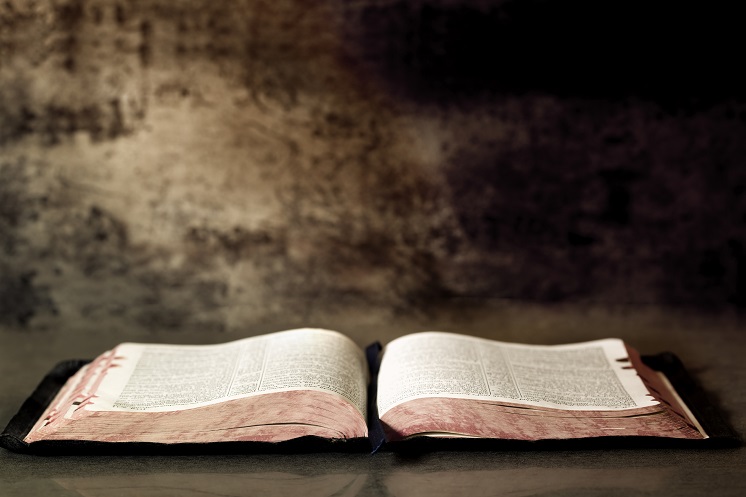
Stephen
Terry, Director

Unity
in Faith
Commentary
for the November 24, 2018 Sabbath School Lesson
 “Then the dragon was enraged at the woman and went off to
wage war against the rest of her offspring—those who keep God’s commands and
hold fast their testimony about Jesus.” Revelation 12:17,
NIV
“Then the dragon was enraged at the woman and went off to
wage war against the rest of her offspring—those who keep God’s commands and
hold fast their testimony about Jesus.” Revelation 12:17,
NIV
Fifty years ago, I found a relationship with Jesus
through the Nazarene Church. Although I was only a teenager, I decided this
relationship would be genuine. While the church I joined did not practice baptism,
they did share with me two rules: no dancing and no card playing. I thought
these would be fairly easy to observe and committed to membership. But I was
soon to be tested on even those simple requirements. I was a member of the Sea
Scouts, and our unit scheduled a mandatory dance for all members who would be
required to attend in uniform. I attended, and I wore my uniform, but I did not
dance. When questioned about it, I simply said “My church does not allow me to.”
I could not give a reason, because I didn’t know why. But I was determined to
remain faithful. As a result, I was made the butt of a lot of ribbing that
night. I felt miserable because my comrades did not respect my faith, but even
worse, I did not fully understand it myself.
Since I had already determined to grow in my
understanding by studying the Bible, I redoubled my efforts. As part of that
program, I was studying the Sunday school lesson intently, but I soon learned
that the instructors each Sunday knew little more than to parrot what was in
the lesson. When I asked why a particular teaching was to be observed, I all
too often simply got blank stares back, or some Christian jargon that the leader
could neither explain nor defend. I was mystified how Christians could know so
little of their own Bible. It also seemed strange to me that they would be
content to continue in that fashion. I could not abide that, and I went
searching for answers while continuing to read my Bible.
Eventually I discovered that God’s real rules were
written on two tablets of stone, and those rules were to be found in Exodus,
chapter 20 and Deuteronomy, chapter 5 in the Old Testament. When I asked my
Nazarene friends about them, I was told that those old rules don’t matter anymore,
because now we have Jesus. But then things went downhill from there because I
asked how that could be when Jesus himself said in the Sermon on the Mount that
he did not come to do away with the law?[i] The response to that was
to accuse me of belonging to a cult and forbidding me to come to youth meetings
anymore. I was not willing to give up trying to find answers and I tried asking
the pastor or other leaders, but only got silence in response. Perhaps they
hoped I would give up and forget about it. But a spiritual fire had been lit in
my heart. They had been instrumental in lighting that fire, but were unable to
carry if forward. The inconsistencies were beginning to wear thin. For
instance, if Jesus somehow did away with the rules, then why were there rules
about card playing and dancing? I was confused and gave up attending church.
However, I did not give up on the Bible and continued my
reading and searching for those who could teach me more. One evening while I
was waiting for the passenger ferry between Port Orchard and Bremerton, I discovered
a postcard application for a Bible correspondence school at Box 55, Los
Angeles, California, The Voice of Prophecy. The course was free so I filled out
the card and sent it in. I quickly completed the lessons as they arrived and
mailed them back in. They just as promptly responded with the corrected lessons
and new ones to complete. I must have been going at an accelerated pace because
by the time I was halfway through the course, they were sending me four lessons
at a time. When I completed that course, I enrolled in several others from the
same school because I had learned so much from the first course. What I
appreciated most was that instead of getting the circular response so common
among Christians that something is believed because that is what the church believes,
every teaching was backed up with a biblical reference and a contextualized
explanation. Rather than seeing the Bible as simply a collection of stories,
some interesting and some less so, I began to see a single golden thread throughout
the entire Bible, both Old and New Testaments. That thread was Jesus and
finding him in everything from Genesis to Revelation provided the unified
understanding that I was seeking.
I discovered that far from being done away with, the law
continues to convict us of sin to this very day.[ii] This is why Jesus offers
us salvation. The law condemns us for breaking it and grace saves us through his
sacrifice on Calvary. But in order to be saved, we must first agree that we
have broken the law and repent of that violation.[iii] If the law was done away
with so it could not be broken, no repentance would be necessary. The very fact
that repentance is necessary validates the law’s claims against us. This, in
essence was the purpose of Jesus’ incarnation. He was born to satisfy the
claims of the law on our behalf. But what is repentance? The Greek word it is
translated from means turning around and going the opposite direction. If the
path we walked before repentance was a path of lawlessness, then logically,
going the opposite direction would mean seeking to walk in harmony with the
law. Once I understood that, I was ready to look at the law once again.
I discovered that most people seem to agree that pretty
much all of the law still applies even if they say the law has been done away with.
People still think murder, theft, and adultery are bad. In fact the only law
that people actually felt no longer applied was the one regarding the Sabbath.
The only Sabbath mentioned in the Bible is what much of the world today calls
Saturday. Throughout the Old Testament and into the New with Jesus and all of
the Apostles, everyone worshipped on Saturday. When I have asked why people
worship on Sunday then, I am often told it is because the law has been done
away with. When I ask why only that law and not the rest, I get no good
answers. Some will admit that the church changed the day of worship to honor
the Lord’s resurrection on Easter Sunday, but they can cite no biblical
direction for such a change. I have since learned that much of the basis for
change can be found in the animosity that developed between the Gentile
Christians and the Jewish Christians from the second century on but that is
beyond the scope of this simple commentary. A good account can be found in “Partings:
How Judaism and Christianity Became Two,” edited by Herschel Shanks. The book
can be found on Amazon. To simplify the issue, Sunday keeping is deeply rooted
in anti-Semitism.
As I continued searching, I discovered that there are
several denominations that are Christian and observe a Saturday Sabbath. There is
the Seventh-day Church of God, the Seventh-day Baptists, but the largest I
discovered is the Seventh-day Adventist Church, with over 20 million members. Almost
50 years ago, I discovered that a Seventh-day Adventist Church was only two
blocks from where I grew up in Port Orchard. I decided to go check it out.
Admittedly, I was leery after my experience with my previous denomination, but
I found that they practiced biblical baptism by immersion after repentance and
the remission of sins through grace alone. They believed that Jesus will return
to resurrect the dead and take both the dead and the living to heaven with new
glorified bodies.[iv]
Even though I have been a attending ever since, I did
not find a collection of saints ready for translation to heaven. Instead I
found people who were well aware that all mankind are sinners including them,
but they know the answer to that is Jesus’ grace and they live in that hope,
seeking to know and understand his will for their lives, and seeking the
leading of the Holy Spirit. If there is one short coming they may have it is
that they sometimes fail to understand how rare that is in the rest of the
world and even in the rest of Christendom, and they may tend to take for
granted these things that unify their faith. Lately they have stumbled over
creeds and esoteric issues of theology, stumbling blocks that have tripped up
much of Christendom at one time or another. If they can rediscover the things which
unify them in Jesus, the rewards will be eternal. And even more exciting anyone
can find that grace and hope as well in the unity of the body of Christ where
all may enter in. Once they do, like me, they may never leave.
For Further Study:
